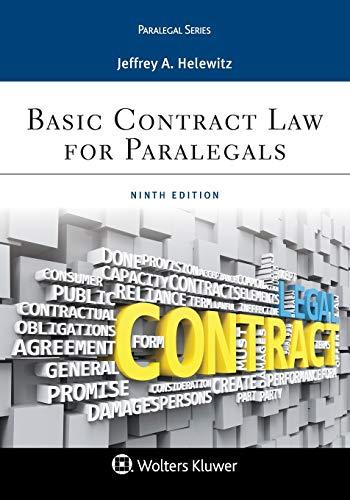The underlying circumstances of this lawsuit are set forth in a December 6, 2005 Order denying defendant
Question:
The underlying circumstances of this lawsuit are set forth in a December 6, 2005 Order denying defendant Jacqueline Tubbs’ motion for summary judgment. Plaintiff Estate alleges its decedent Keith George Church, a citizen of the United Kingdom, and defendant Tubbs, a citizen of Michigan, developed an Internet relationship, with Church later visiting Tubbs in Michigan. Church and Tubbs allegedly became engaged in February 2000, and agreed to be married in July 2000. Estate alleges Church paid off Tubbs’ $4,100.00 credit card debts in return for Tubbs’ promise to repay the loan with money she expected to receive in a workers’ compensation settlement.
Estate also alleges Church gave Tubbs a $7,274.40 engagement ring and deposited $194,852.56 into a bank account for the purpose of purchasing a marital home in Michigan. Following Church’s instructions, Tubbs purchased a Michigan home on April 7, 2000 using the bank account proceeds, titling the real property in both their names as unmarried joint tenants. Church allegedly delivered personal belongings to the Michigan home, including a $4,560.00 family-heirloom diamond ring.
T ubbs allegedly informed Church by e-mail on June 5, 2000, without explanation, that their relationship was over. Two days later, on June 7, 2000, Church executed a will in England. Tubbs thereafter allegedly refused to repay the $4,100.00 credit card loan, to return the engagement ring, to return Church’s personal property, or to convey her interest in the Michigan home to Church. Church died on July 24, 2000. His Estate filed suit in federal court on December 29, 2004 pursuant to the court’s diversity jurisdiction seeking recovery of the alleged $4,100.00 loan, return of the engagement ring, return of Church’s personal property, and full ownership of the Michigan home under theories of breach of an implied in law contract of marriage, unjust enrichment, and conditional gifts vesting only upon marriage.
B. Conditional Gift Implied In Law Contract, Quantum Meruit As a federal district court exercising diversity jurisdiction in Michigan, this court must construe Michigan law in the absence of Michigan Supreme Court precedent by reviewing the decisions of Michigan appellate courts, other federal courts construing Michigan law, restatements of law, law review commentaries, and/or the decisions from other jurisdictions as to the “majority” rule. See Meridian Mutual Ins. Co. v. Kellman, 197 F.3d 1178, 1181 (6th Cir. 1999). This court must predict how the Michigan Supreme Court would rule if faced with the issue. Id.
Engagement Ring The Michigan Court of Appeals has expressly ruled that an engagement ring is a conditional gift, and if the engagement is called off for any reason, the ring is incapable of becoming a completed gift and must be returned to the donor. Meyer v. Mitnick, 244 Mich. App. 697, 703-704, 625 N.W.2d 136 (2001). Tubbs does not dispute that she received an engagement ring from Church on February 16, 2000, and that its price was $7,274.42. Tubbs Tr. at 29-31. Tubbs also testified that she no longer has the ring because she threw it into the Elk Creek River. Tubbs Tr. at 32. Tubbs’ unsupported argument that Church intended to marry her to acquire a green card, even if true, is irrelevant with respect to the conditional gift nature of the ring. Based on Tubbs’ own testimony, Estate is entitled to recover the engagement ring or its $7,274.42 value from Tubbs as a matter of Michigan law. Meyer, 244 Mich.
App. at 703-704; Redding, 241 F.3d at 532; E.E.O.C., 996 F.Supp. at 713.
Michigan Home Estate cites Meyer and decisions from Pennsylvania, New Jersey, and South Dakota for the legal proposition that, like an engagement ring, a gift of real property made in contemplation of marriage is likewise a conditional gift that must be returned to the donor if the engagement is called off. The Michigan Court of Appeals decision in Meyer is limited to engagement rings which, “by their very nature [are] conditional gifts given in contemplation of marriage.” Meyer, 244 Mich. App. at 702. Michigan courts have generally limited recovery on an agreement reached between an unmarried couple to theories of express contract or implied in fact contract, reasoning that to allow recovery based on contracts implied in law or quantum meruit would essentially resurrect common-law marriage in Michigan. See Featherston v.
Steinhoff, 226 Mich. App. 584, 588, 575 N.W.2d 6 (1998). Yet , with respect to an engagement ring, it is “the inherent symbolism of this gift” that permits the conditional nature of the gift to “be implied in fact or imposed by law in order to prevent unjust enrichment.” Meyer, 244 Mich. App. at 701-702 (quoting Brown v. Thomas, 127 Wis.2d 318, 326-327, 379 N.W.2d 868 (Wis.App. 1985))........
Questions
1. How does the court treat the engagement ring, in terms of contract law?
2. How does the court distinguish between the engagement ring and the realty?
3. Why does the court avoid deciding the issue of the credit card payment?
Step by Step Answer:






